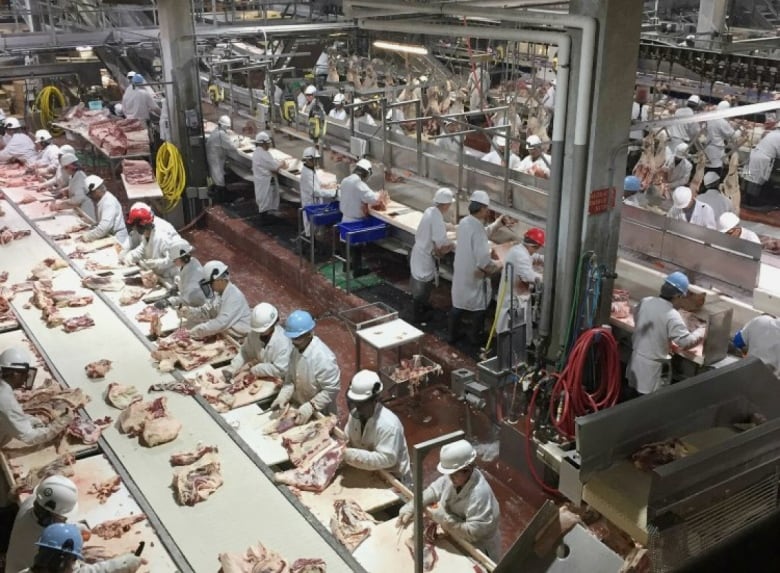Strike looms at one of Canada’s largest beef-processing plants looms as Cargill workers vote against offer | CBC News
The union representing workers at the Cargill meat-packing plant near High River, Alta., says employees have rejected the company’s contract offer after two days of voting — amid health and safety concerns related to COVID-19.
The prospect of a strike starting Dec. 6 has left Prairie ranchers bracing themselves, because the Cargill facility is estimated to process about a third of Canada’s beef.
United Food and Commercial Workers Local 401 said workers have rejected the company’s offer by a 98 per cent margin.
Workers have raised health and safety concerns related to COVID-19, but also want improved benefits, wage increases and quicker movement into new jobs once hired into them, the union says.
Earlier, the union delivered a strike notice warning staff would hit the picket line Dec. 6 if the requested changes weren’t made.

Last year, the meat-packing plant was the site of a deadly COVID-19 outbreak linked to three deaths and positive tests among an additional 950 workers — nearly half its work force — and hundreds of family and community members. Another outbreak in 2021 resulted in dozens of cases.
“Cargill workers have told their employer through another overwhelming vote that they matter and that they deserve something more,” UFCW Local 401 president Thomas Hesse said in a statement.
“We will be communicating the result to Cargill and asking them to return to the bargaining table to respond to our members.”
The union said although Cargill union members have expressed their anger and frustration, they remain ready to make a deal.
Cargill responds
Cargill spokesperson Daniel Sullivan said Thursday the company remains optimistic that an agreement would be reached before the Dec. 6 deadline.
“We are willing to keep meeting to avoid any labour disruption, which is in no one’s best interest during an already challenging time,” read an emailed statement.
“While we navigate this negotiation, we continue to focus on fulfilling food manufacturer, retail and food service customer orders while keeping markets moving for farmers and ranchers. If necessary, we will shift production to other facilities within our broad supply chain footprint to minimize any disruptions.”
Ranchers fear another cattle-processing backlog
Melanie Wowk, a rancher and chair at Alberta Beef Producers, told CBC News in mid-November that the possibility of a strike deeply concerns ranchers, who have already been dealing in the past two years with drought, soaring feed costs and pandemic disruptions that led to massive cattle backlogs.
She fears a strike at the Cargill plant will lead to another cattle backlog, pointing to those experienced last year when the pandemic spurred temporary closures of meat processing plants.
The disruption to processing in North America pushed meat prices higher at grocery stores, but had the opposite effect down the supply chain, where a backlog of cattle emerged.
Ranchers say cattle prices have not kept pace with rising costs, nor with the beef prices seen in grocery stores recently.
They’re also trying to manage the fallout of this summer’s drought that hit pasture land and helped drive up farmers’ feed costs dramatically.
Experts have suggested up to 20 per cent of the Canadian cattle herd could be sold off this fall and winter as producers are forced to decrease the size of their herds or go out of business.
For all the latest business News Click Here

